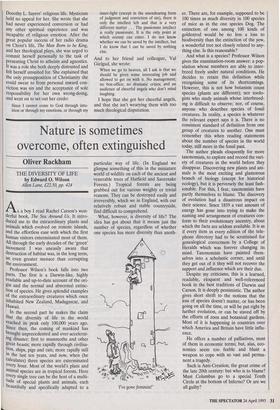Nature is sometimes overcome, often extinguished
Oliver Rackham
THE DIVERSITY OF LIFE by Edward 0. Wilson Allen Lane, £22.50, pp. 424 s a boy I read Rachel Carson's won derful book, The Sea Around Us. It intro- duced me to the extraordinary plants and animals which evolved on remote islands, and the effortless ease with which the first human visitors exterminated most of them. All through the early decades of the 'green' movement I was uneasily aware that destruction of habitat was, in the long term, an even greater menace than corrupting the environment.
Professor Wilson's book falls into two Parts. The first is a Darwin-like, highly readable and up-to-date account of the ori- gin and the normal and abnormal extinc- tion of species. He gives splendid examples of the extraordinary creatures which once inhabited New Zealand, Madagascar, and Hawaii.
In the second part he makes the claim that the diversity of life in the world reached its peak only 100,000 years ago. Since then, the coming of mankind has brought unprecedented and ever-accelerat- ing disaster: first to mammoths and other great beasts; more rapidly through civilisa- tion, ships, pigs and rats; more rapidly still in the last ten years, and now, when (he calculates) three species are exterminated every hour. Most of the world's plant and animal species are in tropical forests. Here every single tree can be the host of a multi- tude of special plants and animals, each beautifully and specifically adapted to a particular way of life. (In England we glimpse something of this in the miniature world of wildlife on each of the ancient and venerable trees of Hatfield and Savernake Forests.) Tropical forests are being grubbed out for various weighty or trivial reasons. They can be destroyed easily and irreversibly, which we in England, with our relatively robust and stable countryside, find difficult to comprehend.
What, however, is diversity of life? The idea has got about that it means just the number of species, regardless of whether one species has more diversity than anoth- er. There are, for example, supposed to be 100 times as much diversity in 100 species of mice as in the one species Dog. The extinction of one among 100 kinds of goldenrod would be no less a loss to biodiversity than the extinction of the yew, a wonderful tree not closely related to any- thing else. Is this reasonable?
And what is a species? Professor Wilson gives the examination-room answer: a pop- ulation whose members are able to inter- breed freely under natural conditions. He decides to retain this definition while recognising some of its shortcomings. However, this is not how botanists count species (plants are different); nor zoolo- gists who study animals whose interbreed- ing is difficult to observe; nor, of course, anyone who describes species of fossil creatures. In reality, a species is whatever the relevant expert says it is. There is no consistent standard of definition from one group of creatures to another. One must remember this when reading statements about the number of species in the world today, still more in the fossil past.
The author pleads eloquently for more taxonomists, to explore and record the vari- ety of creatures in the world before they disappear. Discovering new plants and ani- mals is the most exciting and glamorous branch of biology (except for historical ecology), but it is perversely the least fash- ionable. For this, I fear, taxonomists have partly themselves to blame. The discovery of evolution had a disastrous impact on their science. Since 1859 a vast amount of energy has gone into trying to make the naming and arrangement of creatures con- form to their evolutionary ancestry, about which the facts are seldom available. It is as if every item in every edition of the tele- phone directory had to be scrutinised for genealogical correctness by a College of Heralds which was forever changing its mind. Taxonomists have painted them- selves into a scholastic corner, and until they get out of it they will not recover the support and influence which are their due.
Despite my criticisms, this is a learned, readable, eloquent and well-referenced book in the best traditions of Darwin and Carson. It is deeply pessimistic. The author gives short shrift to the notions that the loss of species doesn't matter, or has been going on all the time, or will be put right by further evolution, or can be staved off by the efforts of zoos and botanical gardens. Most of it is happening in countries over which America and Britain have little influ- ence.
He offers a number of palliatives, most of them in economic terms; but, alas, eco- nomics seem too feeble and blunt a weapon to cope with so vast and perma- nent a tragedy.
Such is Anti-Creation, the great crime of the late 20th century: but who is to blame? Must Columbus go to a special Tenth Circle at the bottom of Inferno? Or are we all guilty?


























































 Previous page
Previous page